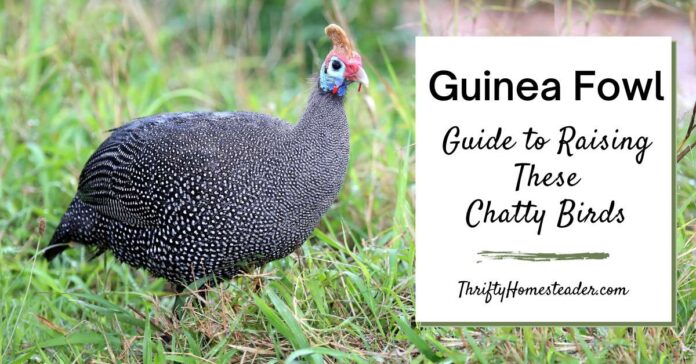
Guinea hens are unique and fascinating birds that have been kept and raised for centuries. Their striking appearance, distinctive sound, and valuable pest-control abilities make them a popular choice for poultry enthusiasts. In this guide, we will explore the unique qualities of Guinea hens and provide helpful tips for keeping and raising them.
Appearance
One of the most striking features of Guinea hens is their unique appearance. They have small, round bodies covered in speckled feathers that come in a wide range of colors, including pearl, lavender, and royal purple. Their heads are adorned with a helmet-like crest, and they have a distinctive call that sounds like a series of “buckwheats.”
Guinea hens are also known for their strong and agile build, which allows them to fly great distances and escape from predators. Their ability to roost in trees makes them excellent at avoiding predators and keeping a lookout for danger.
Personality
Guinea hens are known for their curious and sociable nature. They are highly intelligent birds that are quick to bond with their owners and fellow flock members. They exhibit a strong sense of community and will often form close-knit groups within a larger flock. They are also known for their active and vigilant behavior, which makes them great watchdogs for other poultry and even humans.
Guinea hens are also fiercely independent and enjoy foraging for food on their own. Their natural foraging abilities make them valuable in pest control, as they will eagerly hunt and consume a wide range of insects, including ticks, grasshoppers, and even small rodents. This makes them a valuable addition to any farm or homestead seeking a natural and eco-friendly way to control pests.
Habitat and Housing
Guinea hens are hardy birds that are naturally adapted to living in a wide range of environments. They thrive in free-range environments and are expert foragers, making them well-suited to a variety of agricultural settings. However, they do require some protection from predators, so providing them with a secure coop and enclosed run is essential.
When housing Guinea hens, it’s important to provide them with plenty of space, as they are active and energetic birds that require room to roam and forage. A coop with a secure roosting area and nesting boxes will provide them with a safe and comfortable environment to rest and lay eggs.
Feeding and Nutrition
Guinea hens have specific dietary needs that should be met in order to keep them healthy and thriving. While they are excellent foragers and will consume a wide variety of insects and plants, they also benefit from a balanced diet of high-quality poultry feed. Additionally, providing them with access to grit and oyster shell will help supplement their diet and provide essential nutrients for egg production.
Guinea hens also require regular access to fresh water in order to stay hydrated and maintain good health. It’s important to regularly clean and refill their water dishes to ensure that they have access to clean and fresh drinking water at all times.
Breeding and Egg Production
Guinea hens are known for their prolific egg production, with some individuals laying up to 200 eggs per year. Their eggs are small and are often spotted or speckled in appearance. They are also known for their ability to go broody and raise their own young, making them excellent mothers and providers for their offspring.
When breeding Guinea hens, it’s important to provide them with a safe and secure environment in which to lay and incubate their eggs. Providing them with a secluded nesting area and a comfortable environment for their young will help ensure a successful breeding season.
Health and Care
Guinea hens are generally hardy and low-maintenance birds, but they do require some basic care to keep them healthy and thriving. Regular health checks and access to a veterinarian who specializes in poultry care is essential for monitoring their overall health and well-being.
Additionally, providing them with a clean and secure environment, regular access to fresh water, and a balanced diet will help ensure that they remain healthy and free from disease. They should also be protected from common poultry parasites, such as mites and lice, through regular cleaning and the use of natural remedies or dust baths.
In conclusion, Guinea hens are unique and fascinating birds that have a lot to offer poultry enthusiasts. Their striking appearance, independent nature, and valuable pest-control abilities make them a valuable addition to any farm or homestead. By providing them with a comfortable and secure environment, a balanced diet, and regular health checks, you can raise healthy and thriving Guinea hens that will provide you with years of enjoyment and valuable contributions to your agricultural pursuits.


















